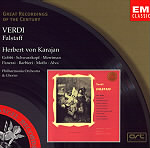This very famous 1956 recording is considered by many to be a classic, but I have always found it to be Karajan at his most wonderfully precise and joyless at the same time. To be sure, the singing is marvelous: Tito Gobbi, with what is certainly a baritone, rather than a bass-baritone voice, makes as much of the text as any great Falstaff. He’s funny, hopeless, annoying, and, above all, fatuous. He always sings with great “face” and energy. Elisabeth Schwarzkopf is her usual meticulous self as Alice Ford, but she’s terribly cold and she therefore changes the focus of our feelings. Anna Moffo and Luigi Alva are ideal young lovers, Fedora Barbieri is a great Quickly (but Simionato for Solti is better), Rolando Panerai’s Ford is properly outraged and, well, also fatuous (though Robert Merrill, again for Solti, finds in Ford his best recorded role). But Karajan examines the score through a microscope, rarely letting the music flow naturally; indeed, there is a stifling lack of spontaneity to his approach. What to do? Well, for me, in Falstaff, great singing never has been the only issue. This is a work filled with wisdom, self-knowledge, irony, and warmth, and you won’t find much of that here.
































